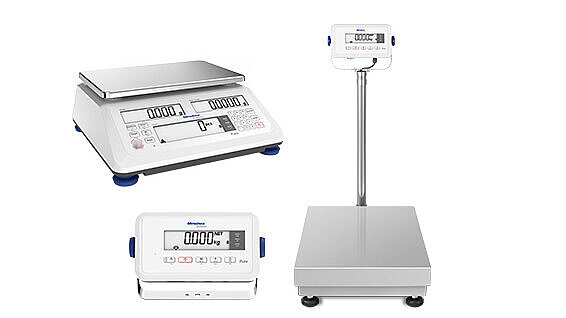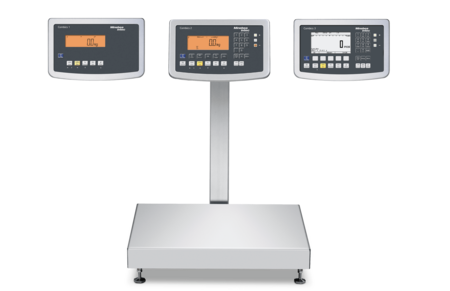How Industrial Scales Work: An Extensive Summary for New Users
Comprehending the auto mechanics behind commercial scales is vital for new users who intend to make sure precision in their dimensions. These tools count on lots cells and stress gauge innovation to convert weight into a measurable style, however the nuances of their operation prolong past simple performance. From the various types available to the important techniques for correct use and upkeep, each element plays a considerable role in achieving reliable outcomes. As we check out these parts, one have to take into consideration just how these components interact to boost efficiency in diverse industrial applications.
Essentials of Industrial Scales
Industrial scales are essential devices utilized throughout different industries, consisting of manufacturing, logistics, and farming, to ensure exact weight dimensions of heavy tons. The essential principle behind commercial scales entails the conversion of weight right into a quantifiable type that can be presented digitally or analogically. These scales employ different mechanisms, such as lots cells or mechanical levers, to determine the weight of items placed upon them.

Along with their dimension capacities, commercial scales are developed to endure severe environments, featuring durable building and construction that withstands dust, wetness, and heavy impacts. Calibration and upkeep are essential to make certain accuracy, as even minor disparities can bring about significant financial implications. By understanding the essentials of commercial scales, users can value their value in various commercial applications.
Sorts Of Industrial Scales
Various types of industrial ranges provide to the varied requirements of different sectors, each created to handle details evaluating tasks with accuracy and reliability. Amongst the most typical kinds are flooring scales, which are excellent for evaluating hefty and large items. These scales generally include large systems and can fit palletized items, making them important in stockrooms and shipping centers.
One more kind is bench ranges, which are frequently made use of for smaller items in production and retail setups. They provide precise dimensions for items that require precision, such as chemicals or parts in setting up lines (Industrial Scales). For mobile procedures, portable scales use adaptability and ease of transport, appropriate for fieldwork or momentary installments
Additionally, specialized scales like checkweighers are used in manufacturing lines to preserve top quality control by ensuring that products fulfill weight requirements. Each kind of commercial range plays an important function in improving functional effectiveness and accuracy across numerous fields.
Just How Evaluating Systems Work
Considering devices are necessary elements that enable accurate dimension of mass across different commercial ranges. These systems utilize various principles of physics and design to give exact weight readings, essential for supply administration, quality assurance, and conformity with regulative standards.
One usual type of considering system is the load cell, which runs on the principle of pressure assesses. When a load is used, the load cell flaws somewhat, creating an electrical signal proportional to the weight. This signal is then converted right into a readable weight dimension by the scale's electronic devices.
Another extensively used device is the mechanical balance, which uses a system of levers and weights. Industrial Scales. This method depends on the concept of balance, where the weight of the things being measured is stabilized against understood weights, permitting for direct dimension
Additionally, hydraulic and pneumatically-driven scales take advantage of liquid dynamics concepts to gauge weight. These systems utilize the stress applied by a load to figure out weight, offering high accuracy for substantial loads.
Appropriate Use Techniques
When using commercial ranges, adhering to proper use strategies is essential for keeping and guaranteeing precise dimensions tools integrity. Most importantly, it is important to select the proper range for your specific application, as ranges differ in ability and precision.
Before evaluating, guarantee that investigate this site the scale is put on a steady, degree surface area complimentary from resonances or disruptions. This will help to reduce errors brought on by external factors. Additionally, calibrate the scale according to the supplier's requirements before make use of, making sure that it is working properly.
When putting products on the scale, disperse the weight equally to stay clear of tipping or damaging the devices. Always allow the range to support before tape-recording the weight, as variations might take place during preliminary placement. For bulk products, use containers that are appropriate for the scale size to stop overloading.
Furthermore, stay clear of putting overly hot or cold items straight on the scale, as temperature variants can impact accuracy. Maintain the weighing system clean and cost-free of debris to prevent contamination and make sure dependable outcomes. By complying with these strategies, individuals can optimize the performance and durability of their industrial scales.
Upkeep and Calibration Tips
Guaranteeing the long life and accuracy of commercial ranges needs attentive maintenance and routine calibration. A preventive maintenance timetable is important; it must include routine examinations to identify deterioration, particularly on tons cells and various other sensitive elements. Regularly cleaning up the range's surface area and guaranteeing the bordering location is devoid of particles will certainly help preserve its integrity and performance.
Calibration is similarly essential and must be executed at regular intervals or whenever the scale experiences substantial changes in temperature, humidity, or physical variation. Make use of certified calibration weights that are traceable to nationwide criteria for precision. Document each calibration session thoroughly to track efficiency with time and identify any trends or repeating problems.
In addition, bear in mind the range's environment. Avoid placing it near sources of vibration, electromagnetic interference, or extreme temperatures, as these elements can negatively impact measurements. Lastly, train all drivers on appropriate scale usage and maintenance protocols to ensure consistent efficiency and precision. By sticking to these maintenance and calibration suggestions, individuals can enhance the reliability of their commercial ranges, making sure ideal operation in any type of setting.
Verdict

Understanding the mechanics behind industrial ranges is crucial for new users that desire to make certain precision in their dimensions.Industrial ranges are necessary devices used throughout different industries, including manufacturing, logistics, and agriculture, to make certain exact weight dimensions of hefty tons. The fundamental principle behind commercial ranges includes the conversion of weight into a measurable kind that can be presented digitally or analogically. By understanding the i thought about this basics of commercial ranges, individuals can appreciate their importance in numerous industrial applications.
In conclusion, understanding the procedure and maintenance of industrial ranges is vital for guaranteeing accurate weight dimensions in different applications. (Industrial Scales)